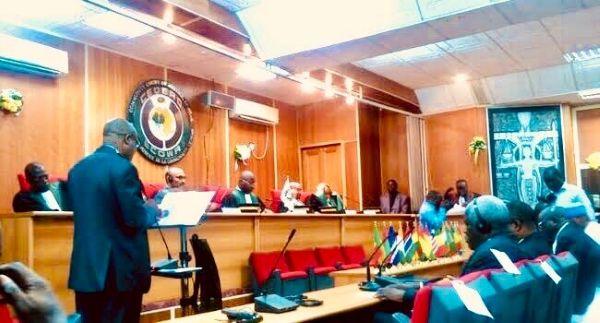🌿 Ruzu Non-Alcoholic Herbal Bitters
Ruzu Non-Alcoholic Herbal Bitters is a natural health supplement specially formulated to:
- ✅ Promote general wellness
- ✅ Detoxify the body
- ✅ Support the treatment of various ailments
Made from a powerful blend of 100% organic and medicinal herbs, Ruzu is completely alcohol-free, making it ideal for:
- 👪 All age groups
- 🌱 Health-conscious individuals
- 🌿 Anyone seeking non-alcoholic herbal remedies
Whether you're looking to boost your vitality, cleanse your system, or support healing the natural way, Ruzu Bitters offers a trusted herbal solution.
The Media Rights Agenda (MRA) has urged the Federal Government to act quickly to fully implement the April 9, 2025, ruling of the ECOWAS Court of Justice, which ruled that parts of Kano State’s blasphemy laws violate Nigeria’s obligations under the International Covenant on Civil and Political Rights (ICCPR) and the African Charter on Human and Peoples’ Rights (ACHPR).
MRA urged the government to swiftly follow the court’s order to bring all of Nigeria’s laws in this area into compliance with its international human rights commitments. MRA emphasized that not following the ruling would not only undermine the rule of law and the regional human rights framework, but also further damage Nigeria’s reputation as a democracy dedicated to the fundamental rights of its people.
The ECOWAS Court ruled on April 9 in a unanimous ruling by three judges in a case brought by the human rights organization Expression Now Human Rights Initiative that the blasphemy clauses in the Kano State Penal Code, its Sharia Penal Code Law of 2000, and similar clauses in other laws violate important human rights guarantees, particularly the right to freedom of expression, which is protected by the African Charter and the ICCPR.
As a signatory to the African Charter and the ICCPR, the court also decided that Nigeria must make sure that all of its internal laws, including state-level laws, adhere to these international agreements.
Because blasphemy provisions in the Kano State Penal Code, its Sharia Penal Code Law of 2000, and similar provisions in other laws are incompatible with Nigeria’s obligations to guarantee freedom of expression under regional and international instruments, it ordered the Federal Government to ensure their repeal or amendment.
Read Also: Buhari Disrespected My Father’s Burial – Shagari’s Grandson Applauds Tinubu
Mr. Monday Arunsi, Acting Head of MRA’s Legal Department, said in a statement released in Lagos that the organization completely agreed with the court’s reasoning that “capital punishment is typically reserved for serious crimes like murder, terrorism, or genocide where there is a clear victim who has suffered grave harm, not speech or disrespect.” The state could restrict the right to free speech in less restrictive methods, according to the court, in order to protect public peace and ensure that individual religious convictions are respected.
“Nigeria cannot choose which of its international obligations to respect,” Mr. Arunsi said. The Federal Government has a moral and legal obligation to abide by the ECOWAS Court’s ruling, which is legally binding. It also has a responsibility to make sure that all federal and state laws protect the rights and freedoms guaranteed by the African Charter and the ICCPR, which Nigeria has voluntarily ratified, and that their provisions are consistent with regional and international instruments to which it is a state party. Therefore, compliance is not optional.
Human rights advocates in Nigeria and abroad have long expressed concern that some provisions of the Sharia Penal Code of Kano State and similar laws in many other states, especially those that criminalize blasphemy and prescribe severe punishments like the death penalty, are incompatible with international human rights standards. He said that the court’s ruling confirms these concerns.
In order to ensure a thorough review and reform of such legislation, in accordance with Nigeria’s international obligations and the court’s orders, Mr. Arunsi urged the Federal Government to “show leadership in the region by taking immediate steps to engage with the government of Kano State and other states with similar laws.”
The protection of human rights, the advancement of justice, and the preservation of Nigeria’s reputation in the international community all depend on “respect for the rule of law and for the decisions of competent international courts,” he emphasized, adding that such reforms should include the amendment or repeal of all provisions that infringe upon the right to freedom of expression while maintaining freedom of thought, conscience, and religion.
Additionally, Mr. Arunsi called on the National Assembly, the National Human Rights Commission, and other pertinent organizations to do their share to guarantee that Nigeria’s legal system completely complies with its obligations under regional and international human rights treaties.
















